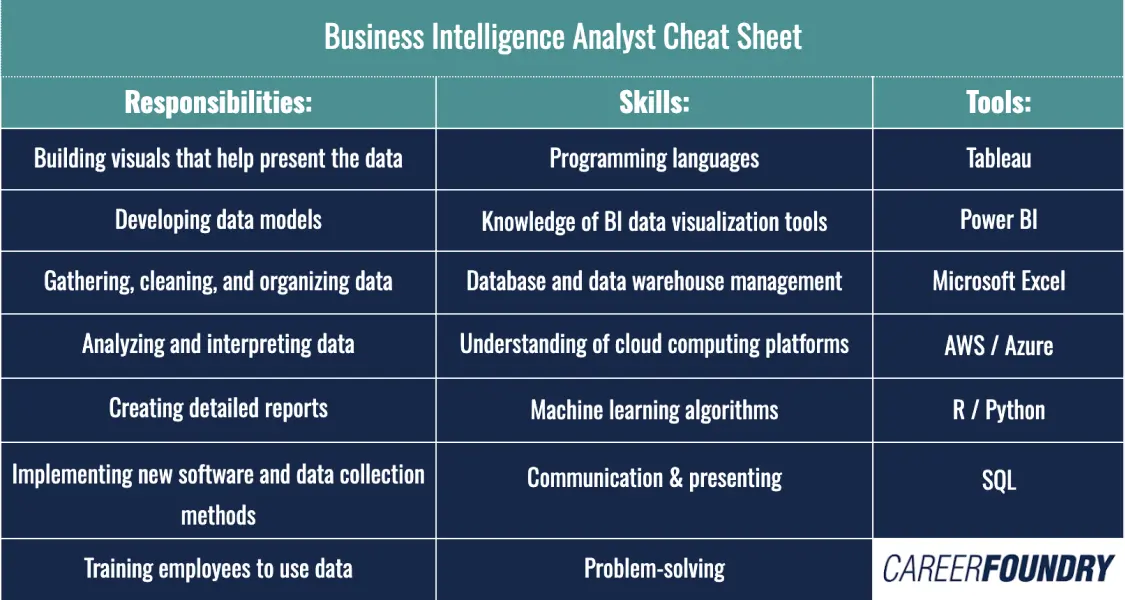Are you new to the world of business intelligence (BI) and have wondered what a business intelligence consultant does?
You might have heard that these consultants leverage data to drive better decision-making and optimize their operations.
But what exactly does a business intelligence consultant do, and how can you become one?
This guide provides a comprehensive overview of the role and skills of a business intelligence consultant so that you can better understand this key role in the corporate world.
We’ll cover the following:
- What is a business intelligence consultant?
- What does a business intelligence consultant do?
- Salary and career prospects for BI consultants
- How to become a business intelligence consultant
- Business intelligence consultant FAQ
- Final thoughts
Read on to learn all about this unique role.
1. What is a business intelligence consultant?
A business intelligence consultant specializes in helping companies analyze and interpret data to make informed decisions, improve processes, and drive business growth.
The primary role of a BI consultant is to interpret data, identify significant trends, and ultimately provide other departments with insights that can enhance decision-making and overall performance.
2. What does a business intelligence consultant do?
BI consultants are responsible for understanding and analyzing data, using various tools and techniques to provide insights and recommendations for business improvement.
They play a pivotal role in helping organizations make data-driven decisions, ultimately leading to better business processes and increased efficiency.
Some techniques employed by BI consultants include:
By leveraging these skills, they can provide valuable insights that help improve business operations and drive growth.
We’ve collected an overview of the skills, tools, and responsibilities business intelligence consultants need:

BI consultant responsibilities
The primary responsibilities of a BI consultant revolve around data collection, analysis, and visualization.
They must gather data from various sources, clean and organize it, and then use their expertise to analyze and interpret the information.
Here’s a simple list of responsibilities they may have:
- Building graphics and visuals that help present the data in a meaningful way
- Developing data models to capture and analyze large amounts of data
- Gathering, cleaning, and organizing data from multiple sources
- Analyzing and interpreting data
- Creating detailed reports to provide recommendations to stakeholders
- Implementing new software and data collection methods
- Training employees to use data in the company
Data visualization plays a crucial role in all these processes, as it helps BI consultants present complex information in a more accessible and easy-to-understand format.
In addition to data analysis, BI consultants may also be involved in data modeling.
This process involves creating visual diagrams of the relationships between different datasets, which can help companies better understand the connections between various aspects of their business.
BI consultants also work closely with other departments within a company, collaborating with personnel to implement new software and data collection systems.
They may also be responsible for training employees on using these systems effectively and making data-driven decisions based on the insights provided.
BI consultant skills
To succeed as a BI consultant, a combination of technical and business skills is essential.
Technical expertise is necessary to comprehend and utilize the instruments and technologies required to analyze data and generate business intelligence solutions.
Some common technical skills for a BI consultant include:
- Expertise in programming languages such as SQL, R, and Python
- Knowledge of BI data visualization tools such as Tableau and Power BI
- Proficiency with database and data warehouse management
- Understanding of cloud computing platforms like Amazon Web Services (AWS) or Microsoft Azure
- Familiarity with machine learning algorithms
Soft skills are also not to be forgotten too! These skills can be highly applicable to businesses and are invaluable for any BI consultant.
Some of these include:
- Excellent communication and presentation skills
- Problem-solving ability to detect trends in data quickly and accurately
- Ability to work independently and collaboratively with various stakeholders
- Adaptability to changing environments or technologies
These soft skills help you to explain complex ideas clearly and concisely, ensuring that everyone involved in the decision-making process understands the data and insights provided.
If you’re looking to be an excellent BI consultant, these are some must-have skills.
BI consultant tools
BI consultants rely on a variety of tools to help them analyze and visualize data.
Here’s a list of some common tools used by them:
- Tableau: Offers a wide range of dashboard and analytics tools for visualizing data
- Power BI: Helps create interactive dashboards to better understand the data
- Microsoft Excel: Allows data manipulation and analysis through formulas
- AWS/Azure: Platforms used for cloud computing and data storage
- R/Python: Programming languages that can be used for data analysis
- SQL: Used to query databases and extract data
Having a good grasp of these tools would enable you to analyze business problems more deeply. This can help you identify trends, detect patterns in data, and provide insights to stakeholders.
3. Salary and career prospects for BI consultants
The salary and career prospects for BI consultants are promising, with a competitive salary range and opportunities for growth and advancement in the field.
Salary range
According to Glassdoor, the average salary of a business intelligence consultant in the US is roughly $124,000 per year.
As with any profession, gaining more experience and expertise in the field can lead to higher earning potential.
Factors such as geographical location and educational background can also influence the remuneration of a BI consultant. However, with the 11% growth in demand for skilled business intelligence professionals, the overall outlook for this career path looks good.
While factors like experience and location play a role in determining salary, it’s clear that a career as a BI consultant can be financially rewarding too!
Career prospects
Job opportunities for BI consultants are widely available across a wide range of industries, including finance, healthcare, and technology. They can choose to work as independent consultants or become part of a consulting firm, providing their expertise to companies on a project-by-project basis.
In my experience, BI consultants also work as freelancers, providing their expertise to companies on a project-by-project basis. This flexibility allows them to work with multiple clients across different industries, giving them diverse experience and knowledge.
Before he graduated from CareerFoundry’s Data Analytics Program, Ray worked as an operations manager for Dolce & Gabana. He plucked up the courage to make the career switch, and now works as a Business Intelligence consultant for international firm bdg!
4. How to become a business intelligence consultant
To become a business intelligence consultant, you’ll need some time and dedication to pick up the right skills to execute all the BI consultant responsibilities I’ve mentioned previously.
Here are some steps to help you get started:
Professional experience
Professional experience is one of the key pieces in building a successful career as a BI consultant.
Completing internships and acquiring entry-level work experience can help aspiring BI consultants gain practical skills and industry knowledge.
Having some real work experience in a smaller capacity, like even part-time BI work, can also add up by demonstrating the right skill sets to employers.
Developing relevant skills
Obtaining professional certifications in relevant areas, such as data analytics or business intelligence tools, can also enhance your credibility and marketability in the job market.
In such a highly technical role of a BI consultant, you’ll need to learn all the right tools, which will require a good understanding of programming languages like Python and R. Learning SQL is also essential, as it will enable you to query databases and gain insights from data sets.
These skills can be picked up by working on business intelligence projects that are relevant to the industry you’d like to work in.
Further education
Pursuing an advanced degree in business analytics or a related discipline can also benefit you. This is only if you want to further your education and increase your earning potential.
This additional education can provide a deeper understanding of the intricacies of data analysis and business intelligence solutions, setting the stage for a successful career as a BI consultant.
This step can be especially useful if you’re planning to enter the field of BI by starting out as a business intelligence analyst or business analyst, followed by working your way up to a more senior role of a BI consultant.
4. Business intelligence consultant FAQs
How much does a business intelligence consultant make?
A business intelligence consultant in the US makes about $124,000 per year, according to Glassdoor. This number can vary depending on experience, location, and formal education.
Do I need a degree to become a business intelligence consultant?
No, you don’t necessarily need a degree to be a business intelligence consultant. Having relevant professional experience and demonstrated skills through projects can be good enough for a job as a BI consultant. However, having an advanced degree in analytics or another related field can give you an edge when applying for more senior roles.
Why is business intelligence important in a consulting role?
Business intelligence is important in a consulting role because it enables you to provide insights into data, trends, and patterns that are not easily visible. Being able to uncover these hidden gems can help businesses make better decisions and improve the overall efficiency of their operations.
What is the difference between a business intelligence consultant and a business analyst?
The main difference between a business intelligence consultant and a business analyst is that a BI consultant has more experience in data analysis, while a business analyst tends to focus on the overall operations of the company.
Is business intelligence a tech role?
Yes, business intelligence is a tech role. As a BI consultant, you’ll need to be familiar with various programming languages and software tools to analyze data sets and present insights. You’ll also need to understand the fundamentals of database architecture and query optimization in order to execute your job responsibilities effectively.
Final thoughts
In summary, business intelligence consultants play a pivotal role in helping companies navigate the complex world of data-driven decision-making.
With a solid foundation in education, professional experience, and the development of critical skills, aspiring BI consultants can build a rewarding and impactful career in this growing field.
As the demand for skilled professionals in business intelligence continues to rise, the opportunities for personal and professional growth are abundant.
Thinking of starting a career in business intelligence? You should give this free 5-day data analytics short course a try. It features some of the tools and skills of a BI consultant too.
For more related content, check out these other articles:
